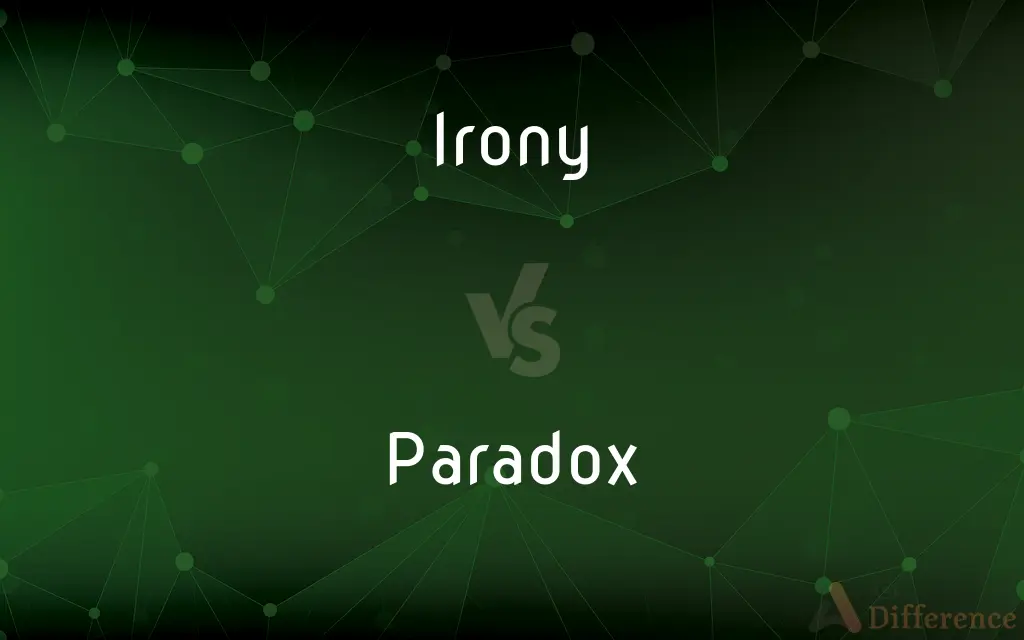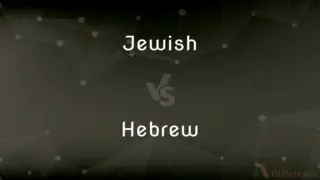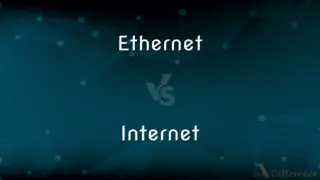Irony vs. Paradox — What's the Difference?
Edited by Tayyaba Rehman — By Fiza Rafique — Updated on October 11, 2023
Irony involves expressing the opposite of what's expected. Paradox is a statement that seems contradictory but holds truth.

Difference Between Irony and Paradox
Table of Contents
ADVERTISEMENT
Key Differences
Irony is a literary or rhetorical device where the intended meaning is opposite to the literal or usual meaning of a statement or situation. Paradox, on the other hand, is a statement or proposition that, upon first glance, seems self-contradictory or absurd, but upon reflection, reveals some deeper truth.
Irony often plays with expectations, using words or situations in a manner where the outcome is contrary to what one might anticipate. Paradox challenges the reader or listener's perception of logic, presenting them with a statement that defies conventional understanding, yet holds a latent truth.
A common form of irony is sarcasm, where words convey contempt or ridicule by stating the opposite of the intended meaning. Paradox doesn't rely on opposition but rather on presenting an inherent contradiction that, surprisingly, makes sense upon closer examination.
Irony can be situational, where there's a disparity between what's expected to happen and what actually occurs. Paradox doesn’t focus on events or situations but is primarily a verbal construct, an assertion that challenges our understanding of logic and truth.
Both irony and paradox are tools employed by writers and speakers to provoke thought, elicit surprise, and engage audiences. While irony plays with contrasts and overturned expectations, paradox forces a reevaluation of seemingly conflicting ideas to unearth a hidden truth.
ADVERTISEMENT
Comparison Chart
Definition
Expressing the opposite of what's expected
Statement that seems contradictory but reveals truth
Focus
Contrasts between expectation and reality
Inherent contradiction that holds deeper meaning
Types
Verbal, situational, dramatic
Verbal
Primary Use
Elicit surprise, challenge expectations
Provoke thought, challenge perceptions of truth
Example
"How nice!" when something unpleasant happens
"Less is more"
Compare with Definitions
Irony
Expressing meaning by using language that typically signifies the opposite.
It's sunny, she said during a downpour.
Paradox
A seemingly contradictory statement that may reveal a truth.
This is the beginning of the end.
Irony
A dramatic effect where the audience knows something the characters do not.
In Romeo and Juliet, the audience knows Juliet isn't really dead, but Romeo does not.
Paradox
A situation or statement that contains conflicting elements.
Deep down, you're really shallow.
Irony
A situation where the outcome is opposite to what was expected.
The firehouse burned down while firefighters were responding to a call elsewhere.
Paradox
A proposition that defies intuition but may hold validity.
The only constant is change.
Irony
A disparity between appearance and reality.
The most successful person in the class was the one everyone underestimated.
Paradox
A paradox is a logically self-contradictory statement or a statement that runs contrary to one's expectation. It is a statement that, despite apparently valid reasoning from true premises, leads to a seemingly self-contradictory or a logically unacceptable conclusion.
Irony
Irony (from Ancient Greek εἰρωνεία eirōneía 'dissimulation, feigned ignorance'), in its broadest sense, is a rhetorical device, literary technique, or event in which what on the surface appears to be the case or to be expected differs radically from what is actually the case. Irony can be categorized into different types, including verbal irony, dramatic irony, and situational irony.
Paradox
A seemingly absurd or contradictory statement or proposition which when investigated may prove to be well founded or true
The uncertainty principle leads to all sorts of paradoxes, like the particles being in two places at once
Irony
The use of words to express something different from and often opposite to their literal meaning.
Paradox
A statement that seems to contradict itself but may nonetheless be true
The paradox that standing is more tiring than walking.
Irony
An expression or utterance marked by a deliberate contrast between apparent and intended meaning
"the embodiment of the waspish don, from his Oxbridge tweeds to the bone-dry ironies of his speech and prose" (Ron Rosenbaum).
Paradox
A person, thing, or situation that exhibits inexplicable or contradictory aspects
"The silence of midnight, to speak truly, though apparently a paradox, rung in my ears" (Mary Shelley).
Irony
Incongruity between what might be expected and what actually occurs
"Hyde noted the irony of Ireland's copying the nation she most hated" (Richard Kain).
Paradox
A statement that is self-contradictory or logically untenable, though based on a valid deduction from acceptable premises.
Irony
An occurrence, result, or circumstance notable for such incongruity
The ironies of fate. See Usage Note at ironic.
Paradox
An apparently self-contradictory statement, which can only be true if it is false, and vice versa.
"This sentence is false" is a paradox.
Irony
Dramatic irony.
Paradox
A counterintuitive conclusion or outcome.
It is an interesting paradox that drinking a lot of water can often make you feel thirsty.
Irony
Socratic irony.
Paradox
A claim that two apparently contradictory ideas are true.
Not having a fashion is a fashion; that's a paradox.
Irony
(rhetoric) The quality of a statement that, when taken in context, may actually mean something different from, or the opposite of, what is written literally; the use of words expressing something other than their literal intention, often in a humorous context.
Paradox
A thing involving contradictory yet interrelated elements that exist simultaneously and persist over time.
Irony
(countable) An ironic statement.
Paradox
A person or thing having contradictory properties.
He is a paradox; you would not expect him in that political party.
Irony
Dramatic irony: a theatrical effect in which the meaning of a situation, or some incongruity in the plot, is understood by the audience, but not by the characters in the play.
Paradox
An unanswerable question or difficult puzzle, particularly one which leads to a deeper truth.
Irony
Socratic irony: ignorance feigned for the purpose of confounding or provoking an antagonist.
Paradox
(obsolete) A statement which is difficult to believe, or which goes against general belief.
Irony
(informal){{cite-journal
Paradox
(uncountable) The use of counterintuitive or contradictory statements (paradoxes) in speech or writing.
Irony
Of or pertaining to the metal iron.
The food had an irony taste to it.
Paradox
A state in which one is logically compelled to contradict oneself.
Irony
Made or consisting of iron; partaking of iron; iron; as, irony chains; irony particles; - In this sense iron is the more common term.
Paradox
The practice of giving instructions that are opposed to the therapist's actual intent, with the intention that the client will disobey or be unable to obey.
Irony
Resembling iron in taste, hardness, or other physical property.
Paradox
A tenet or proposition contrary to received opinion; an assertion or sentiment seemingly contradictory, or opposed to common sense; that which in appearance or terms is absurd, but yet may be true in fact.
A gloss there is to color that paradox, and make it appear in show not to be altogether unreasonable.
This was sometime a paradox, but now the time gives it proof.
Irony
Dissimulation; ignorance feigned for the purpose of confounding or provoking an antagonist.
Paradox
(logic) a self-contradiction;
`I always lie' is a paradox because if it is true it must be false
Irony
A sort of humor, ridicule, or light sarcasm, which adopts a mode of speech the meaning of which is contrary to the literal sense of the words.
Paradox
A statement that opposes common sense but could be true.
The more you know, the more you realize you don't know.
Irony
Witty language used to convey insults or scorn;
He used sarcasm to upset his opponent
Irony is wasted on the stupid
Satire is a sort of glass, wherein beholders do generally discover everybody's face but their own
Paradox
Using contradiction to bring out the reality of a situation.
The enemy of my enemy is my friend.
Irony
Incongruity between what might be expected and what actually occurs;
The irony of Ireland's copying the nation she most hated
Irony
A trope that involves incongruity between what is expected and what occurs
Irony
Employing words to convey contempt or ridicule.
Oh, great! he exclaimed when his car wouldn't start.
Common Curiosities
Is a paradox always true?
Not necessarily. A paradox presents an apparent contradiction that may reveal a deeper truth, but not every paradoxical statement is true.
Can dramatic irony be found in movies?
Yes, dramatic irony is common in movies where the audience knows something the characters do not.
What does irony mainly play with?
Irony plays with contrasts between expectation and reality.
Does a paradox always involve opposites?
Not always. Paradoxes are contradictory on the surface, but they don't always involve direct opposites.
Can irony be found in everyday situations?
Yes, situational irony happens when there's a discrepancy between what's expected to occur and what actually happens.
Why do authors use irony?
Authors use irony to challenge expectations, create humor, or underscore a theme or message.
Can irony be unintentional?
Yes, sometimes events can be ironically opposite to what was expected without intentional design.
Is a paradox meant to confuse the reader?
Not necessarily. Paradoxes challenge conventional understanding, but they're meant to provoke thought more than confusion.
Can a statement be both ironic and paradoxical?
While they have distinct definitions, certain statements or situations might be interpreted as both ironic and paradoxical depending on context.
How can one differentiate between a paradox and a simple contradiction?
A simple contradiction is just opposing statements with no deeper truth. A paradox seems contradictory but contains an underlying truth or insight.
Can real-life events be paradoxical?
Yes, real-life situations can be paradoxical when they defy conventional understanding yet offer deeper insights or truths.
Is every contradictory statement a paradox?
No. Only those that contain an element of truth or deeper insight are considered paradoxes.
Is it true that irony is always humorous?
Not always. While irony often has a humorous element, it can also be tragic or neutral.
Is sarcasm a form of irony?
Yes, sarcasm is a form of verbal irony where words convey contempt or ridicule by stating the opposite of the intended meaning.
Why are paradoxes important in literature?
Paradoxes challenge readers to think deeper, understand varied perspectives, and appreciate complexities of truth.
Share Your Discovery

Previous Comparison
Jewish vs. Hebrew
Next Comparison
Ethernet vs. InternetAuthor Spotlight
Written by
Fiza RafiqueFiza Rafique is a skilled content writer at AskDifference.com, where she meticulously refines and enhances written pieces. Drawing from her vast editorial expertise, Fiza ensures clarity, accuracy, and precision in every article. Passionate about language, she continually seeks to elevate the quality of content for readers worldwide.
Edited by
Tayyaba RehmanTayyaba Rehman is a distinguished writer, currently serving as a primary contributor to askdifference.com. As a researcher in semantics and etymology, Tayyaba's passion for the complexity of languages and their distinctions has found a perfect home on the platform. Tayyaba delves into the intricacies of language, distinguishing between commonly confused words and phrases, thereby providing clarity for readers worldwide.
















































